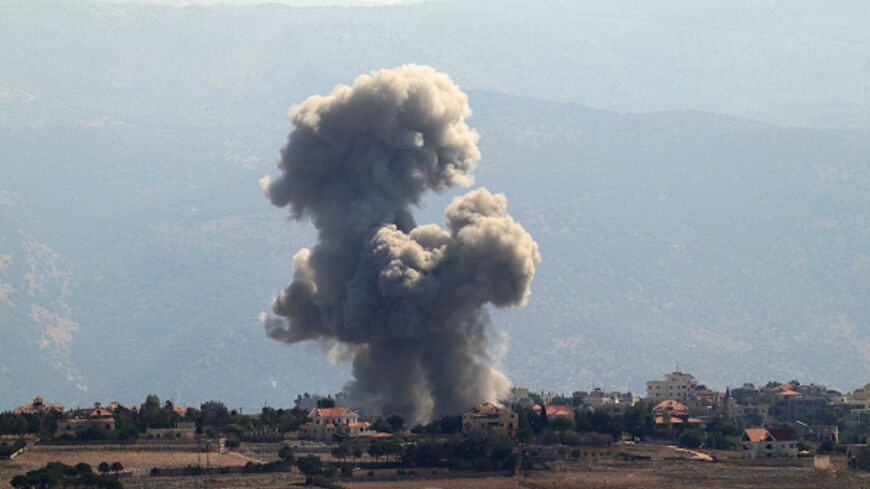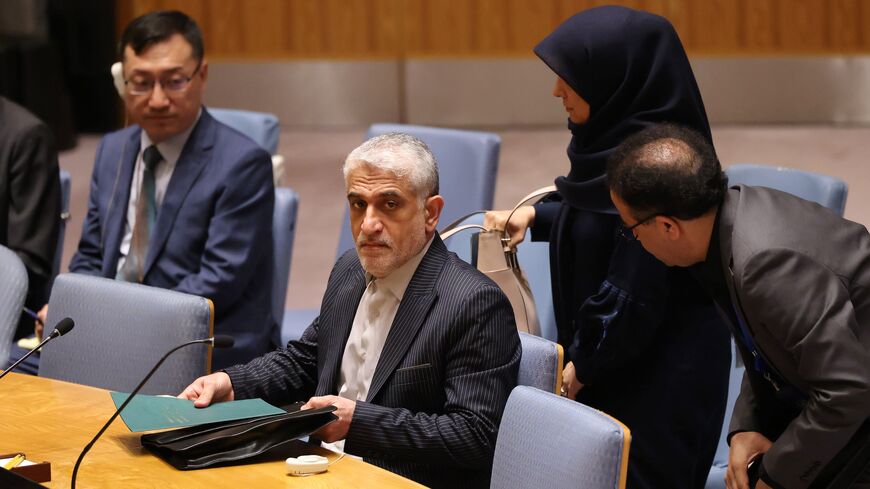Why is US deploying Marines to East Med amid Israel-Hezbollah tension?
The deployment broadens the options available to decision-makers in Washington amid concerns that a threatened Israeli offensive against Hezbollah in Lebanon may trigger a wider regional war.

WASHINGTON — The US Navy is sending three amphibious ships along with the 24th Marine Expeditionary Unit into the eastern Mediterranean amid concerns of a potential war between Israel and Hezbollah along Lebanon's southern border.
The amphibious assault ship USS Wasp, carrying the bulk of some 2,200 Marines and sailors of the 24th MEU, crossed the Strait of Gibraltar on Wednesday to link up with the USS Oak Hill. The USS New York, an amphibious transport dock, is en route from an exercise in the Baltic region, Navy officials said.
Why it matters: Two US defense officials told Al-Monitor that the deployment of the Wasp Amphibious Ready Group and 24th MEU was part of a scheduled rotation.
The deployment comes, however, amid increasing concerns in Washington that Israel may launch an air campaign and potentially a ground invasion to push Hezbollah's elite Radwan Forces back from Lebanon's border with Israel.
Several countries ordered their citizens to evacuate Lebanon this week, among them Germany, Canada and the Netherlands, though the US has not done so yet.
Current and former US officials say such a war would devastate Lebanon and could result in significant casualties and damage in Israel, as Hezbollah's massive arsenal of rockets, drones and missiles may overwhelm the country's Iron Dome air defenses. US officials are also concerned the fighting could draw in Iran-backed militias in Iraq and Syria, as well as potentially Iran’s own military forces.
“Another war between Israel and Hezbollah could easily become a regional war, with terrible consequences for the Middle East,” US Defense Secretary Lloyd Austin warned earlier this week, in rare pointed remarks alongside his Israeli counterpart, Defense Minister Yoav Gallant.
Averting a wider regional war has been a top priority of the Biden administration amid the conflict that erupted Oct. 7 between Israel and Hamas. Hezbollah is estimated to possess at least 150,000 rockets, as well as thousands of precision-guided drones and missiles.
Senior Israeli officials have signaled they will defer to long-shot, US-led diplomatic efforts in the coming weeks as the Biden administration's energy envoy, Amos Hochstein, tries to negotiate a de-escalation along the border. Yet Israeli officials refuse to rule out a campaign against Hezbollah, which is thought to possess an arsenal some 10-times larger than what it had prior to its 2006 war against Israel.
Israel Defense Forces Chief of Staff Lt. Gen. Herzi Halevi told troops near Israel's northern border earlier this week, “The probability of a war starting in the coming months is high.” He added, “When needed, we will advance with all our might.”
During a diplomatic visit to Washington on Tuesday, Gallant told Secretary Austin, “We are working closely together to achieve an agreement but we must also discuss readiness on every possible scenario.”
Looming impasse
More than 60,000 Israeli citizens evacuated from towns in the north have been unable to return for months due to cross-border Hezbollah strikes. That has put tremendous domestic pressure on Prime Minister Benjamin Netanyahu's fragile coalition government to take action to stop the attacks by the Lebanese Shiite militia.
Hezbollah Secretary-General Hassan Nasrallah has said the strikes will only stop after a cease-fire is achieved in Gaza. Talks over the latest proposal have stalled with Netanyahu refusing to endorse Hamas' demand for a permanent end to the fighting.
What's next: Biden administration officials have said they will fully provide for Israel's defense in case of a war with Hezbollah. Administration officials remain concerned that a full-blown war between Israel and Hezbollah could lead to drone and rocket attacks against US troops by Iran-armed militias in Iraq and Syria.
“We're certainly mindful of the risks to our troops and our facilities throughout the region. And that risk has certainly not mitigated in recent months,” White House National Security Council coordinator John Kirby told reporters on Wednesday.
“It's something we're watching very closely,” Kirby added. “We continue to monitor it. We also modify force-protection procedures and protocols as the threat changes, and it does change.”
The presence of a special operations–capable Marine Expeditionary Unit gives decision-makers in Washington options, one defense official said. MEU's are designed to be self-sustaining, packing their own close- and long-range air support, artillery and armored vehicles for amphibious landings for use before additional support arrives. They also specialize in evacuating non-combatants from war zones, but no such order has been given, one official said.
Pentagon deputy spokesperson Sabrina Singh on Friday brushed aside the likelihood of an evacuation from Lebanon and Israel, telling reporters that the reason for deploying the Wasp ARG / 24th MEU was to “ensure regional stability and deter aggression.”
“It has many other capabilities, one being if there was a need for any type of departure, it can be there to assist in that,” she acknowledged.
A task force of US Navy ships and Marines, including elements of the 24th MEU, evacuated some 15,000 US citizens from Lebanon amid Israel's 2006 offensive, during the opening stages of which Israeli warplanes bombed runways at Beirut's main airport, inhibiting commercial flights. The United States estimated there to be 25,000 Americans in the country at the time.
There were some 86,000 US citizens in Lebanon in 2022, according to the US State Department, which on Thursday warned US citizens against traveling to Lebanon.
Know more: The Pentagon's top-ranking general, Chairman of the Joint Chiefs of Staff Charles Q. Brown, publicly cautioned earlier this week that due to the shorter range potentially involved in an Israel-Hezbollah war, a US-led defense of Israel's airspace during such a conflict may not be as effective as the effort mounted in April by France, Jordan, the United Kingdom and the United States to thwart Iran's aerial counterattack against Israel.







